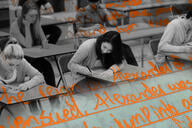You have /5 articles left.
Sign up for a free account or log in.
WASHINGTON -- The National Labor Relations Board on Monday posed a series of questions that could lead to rulings on whether adjuncts have the right to unionize at religious colleges, and whether a 1980 Supreme Court ruling should continue to effectively bar tenure-track faculty members from unionizing at private institutions.
The requests for briefs came in a dispute involving an attempt by adjuncts to unionize at Pacific Lutheran University, but the issues raised by the NLRB questions could lead to decisions with widespread impact. Several religious colleges are currently trying to block adjunct unions, saying that collective bargaining could intrude on the First Amendment rights to freedom of religion.
The NLRB's list of 12 questions go beyond that dispute however, to the landmark 1980 decision in NLRB v. Yeshiva University. Pacific Lutheran's lawyers have argued that adjuncts at that institution are in fact managers as covered by the Yeshiva ruling. But even aside from the Pacific Lutheran case, the NLRB has expressed interest in revisiting Yeshiva. It asked interested parties for briefs on the issue in 2012 and has yet to rule -- although for much of that time lawsuits have challenged the authority of some appointees by President Obama to the board.
Adjuncts at Religious Colleges
Pacific Lutheran is one of several religious colleges at which adjuncts are trying to unionize. At a number of private colleges (some with religious affiliations), adjuncts have formed unions and won gains in wages, benefits and job security. But several Roman Catholic colleges and now Pacific Lutheran have invoked a 1979 Supreme Court ruling in NLRB v. Catholic Bishop of Chicago that the NLRB could not authorize union elections for lay teachers at Catholic schools because doing so would create "a significant risk of infringement of the Religion Clauses of the First Amendment if the act conferred jurisdiction over church-operated schools."
Adjuncts have argued that they aren't looking to challenge any college's religious direction, and that they want collective bargaining for issues of wages, health insurance and job security. The vast majority of adjuncts at religious colleges teach secular subjects and respect the right of various denominations to settle theological matters, union leaders say.
Jane Harty, a member of the SEIU organizing committee at Pacific Lutheran, said that "the university should not hide behind religious affiliations to deny fair treatment and fair wages. I'm a Lutheran but I don't teach anything about religion." (She teaches music.)
Pacific Lutheran's lawyers did not respond to requests for comment. But the university has published a summary of its views on the adjunct union, opposing it for a range of issues. The statement says that "our faculty have been working very hard on policies that will address many of the concerns of our contingent faculty colleagues. Having an outside organization that does not understand our university is not going to be helpful to a collaborative approach on the issues, nor to the quality of teaching and learning on campus."
Adjuncts as Managers
The link between Yeshiva and the Pacific Lutheran case was made in the brief filed by Pacific Lutheran with the NLRB. The brief argues that Yeshiva's definition of managerial status was based in part on faculty control over key academic matters through votes of a faculty governance body. At Pacific Lutheran, the brief argues, full-time, non-tenure track faculty participate in governance, and this makes them managers.
"The record is clear that every voting member of the Faculty Assembly (including contingent full-time faculty members) is a managerial employee under Yeshiva," the university brief says. "At PLU, the Faculty Handbook governs the faculty organization (Section 2), academic policies, procedures and services (Section 3), personnel policies and employee benefits (Section 4), and special institutional policies and procedures (Section 5). Any decision to change the Faculty Handbook starts with and requires a vote of the Faculty Assembly.
"In Yeshiva, the ability of a faculty member to exercise authority over the same set of subjects governed at PLU in the Faculty Handbook made the entire Yeshiva faculty managerial.... The tenure-line faculty at PLU are unquestionably managerial under Yeshiva. Because full-time contingent faculty have exactly the same ability to 'exercise authority' through the Faculty Assembly, the full-time contingent faculty are also managerial."
Keith Hoeller, a longtime adjunct activist in Washington State and editor of Equality for Contingent Faculty: Overcoming the Two-Tier System (Vanderbilt University Press), said he was shocked by the argument. "I'm almost floored by it," he said. Adjuncts -- even those in a faculty body -- lack the job security and full academic freedom of tenure-track professors, he said. "To call this argument a stretch would be an understatement," he said. "Simply having some seats in a senate does not turn one into a manager."
Questions on 'Yeshiva'
Many of the questions posed by the NLRB about Yeshiva are not directly related to Pacific Lutheran, but are similar if not identical to the questions posed by the board in 2012. Those questions resulted in numerous briefs filed by unions, college associations and others debating whether private college faculty should have the right to unionize. Technically, those briefs related to an attempt to unionize at Point Park University, in Pennsylvania. The NLRB has still yet to rule on that case or on the broader issues raised by the questions about Yeshiva.
William A. Herbert, executive director of the National Center for the Study of Collective Bargaining in Higher Education, at Hunter College of the City University of New York, cautioned against reading too much into all the questions that the NLRB is asking.
While the outcome of these deliberations will be hugely important, he said, not too much can be determined by the questions. "I think this just shows that the NLRB is being very deliberative," he said.




